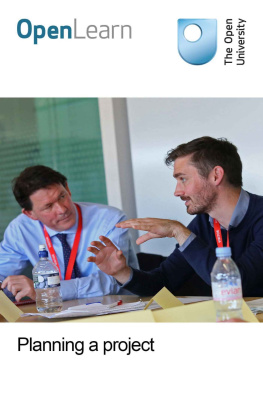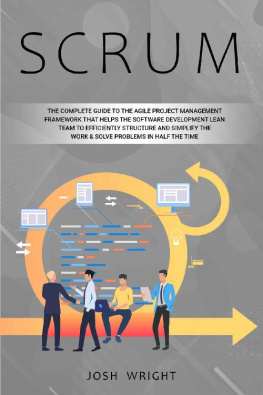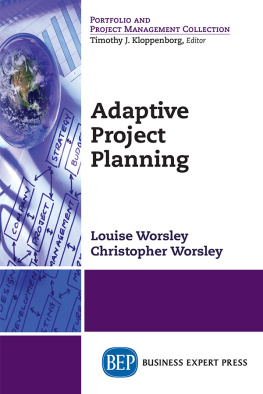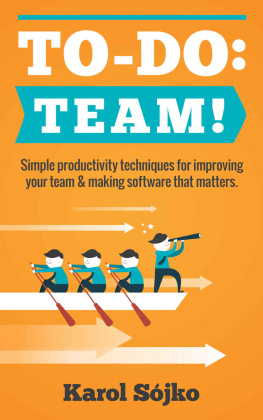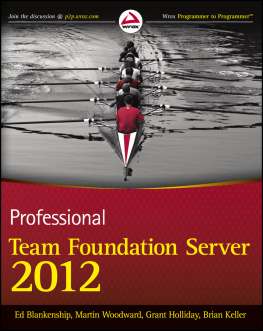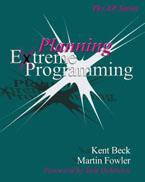Open University. M355 Course Team - Software project planning
Here you can read online Open University. M355 Course Team - Software project planning full text of the book (entire story) in english for free. Download pdf and epub, get meaning, cover and reviews about this ebook. City: Milton Keynes, year: 1990;2016, publisher: The Open University, genre: Business. Description of the work, (preface) as well as reviews are available. Best literature library LitArk.com created for fans of good reading and offers a wide selection of genres:
Romance novel
Science fiction
Adventure
Detective
Science
History
Home and family
Prose
Art
Politics
Computer
Non-fiction
Religion
Business
Children
Humor
Choose a favorite category and find really read worthwhile books. Enjoy immersion in the world of imagination, feel the emotions of the characters or learn something new for yourself, make an fascinating discovery.
- Book:Software project planning
- Author:
- Publisher:The Open University
- Genre:
- Year:1990;2016
- City:Milton Keynes
- Rating:3 / 5
- Favourites:Add to favourites
- Your mark:
- 60
- 1
- 2
- 3
- 4
- 5
Software project planning: summary, description and annotation
We offer to read an annotation, description, summary or preface (depends on what the author of the book "Software project planning" wrote himself). If you haven't found the necessary information about the book — write in the comments, we will try to find it.
Software project planning — read online for free the complete book (whole text) full work
Below is the text of the book, divided by pages. System saving the place of the last page read, allows you to conveniently read the book "Software project planning" online for free, without having to search again every time where you left off. Put a bookmark, and you can go to the page where you finished reading at any time.
Font size:
Interval:
Bookmark:
About this free course
This free course provides a sample of postgraduate study in Business http://www.open.ac.uk/postgraduate/find/business
This version of the content may include video, images and interactive content that may not be optimised for your device.
You can experience this free course as it was originally designed on OpenLearn, the home of free learning from The Open University: www.open.edu/openlearn/money-management/management/business-studies/planning-project/content-section-0.
There youll also be able to track your progress via your activity record, which you can use to demonstrate your learning.
The Open University Walton Hall, Milton Keynes MK7 6AA
Copyright 2016 The Open University
Intellectual property
Unless otherwise stated, this resource is released under the terms of the Creative Commons Licence v4.0 http://creativecommons.org/licenses/by-nc-sa/4.0/deed.en_GB. Within that The Open University interprets this licence in the following way: www.open.edu/openlearn/about-openlearn/frequently-asked-questions-on-openlearn. Copyright and rights falling outside the terms of the Creative Commons Licence are retained or controlled by The Open University. Please read the full text before using any of the content.
We believe the primary barrier to accessing high-quality educational experiences is cost, which is why we aim to publish as much free content as possible under an open licence. If it proves difficult to release content under our preferred Creative Commons licence (e.g. because we cant afford or gain the clearances or find suitable alternatives), we will still release the materials for free under a personal end-user licence.
This is because the learning experience will always be the same high quality offering and that should always be seen as positive even if at times the licensing is different to Creative Commons.
When using the content you must attribute us (The Open University) (the OU) and any identified author in accordance with the terms of the Creative Commons Licence.
The Acknowledgements section is used to list, amongst other things, third party (Proprietary), licensed content which is not subject to Creative Commons licensing. Proprietary content must be used (retained) intact and in context to the content at all times.
The Acknowledgements section is also used to bring to your attention any other Special Restrictions which may apply to the content. For example there may be times when the Creative Commons Non-Commercial Sharealike licence does not apply to any of the content even if owned by us (The Open University). In these instances, unless stated otherwise, the content may be used for personal and non-commercial use.
We have also identified as Proprietary other material included in the content which is not subject to Creative Commons Licence. These are OU logos, trading names and may extend to certain photographic and video images and sound recordings and any other material as may be brought to your attention.
Unauthorised use of any of the content may constitute a breach of the terms and conditions and/or intellectual property laws.
We reserve the right to alter, amend or bring to an end any terms and conditions provided here without notice.
All rights falling outside the terms of the Creative Commons licence are retained or controlled by The Open University.
Head of Intellectual Property, The Open University
The Open University
978 1 47300 022 3 (.kdl)
978 1 47300 117 6 (.epub)
This course will help you to develop the skills required when planning a project. You will examine the various components of a project plan, and be introduced to a number of tools and techniques to aid planning.
This OpenLearn course provides a sample of postgraduate study in Business
After studying this course, you should be able to:
- develop plans with relevant people to achieve the project's goals
- break work down into tasks and determine handover procedures
- identify links and dependencies, and schedule to achieve deliverables
- estimate and cost the human and physical resources required, and make plans to obtain the necessary resources
- allocate roles with clear lines of responsibility and accountability.
Once the project brief has been agreed by the project sponsors and approved by the main stakeholders, you can move into the detailed planning phase. The project plan can become a working tool that helps to keep the project team focused on the project's tasks and activities and points them towards completion. It enables managers to keep track of resources, time and progress towards achieving objectives.
All projects are different and the planning for each will be different. The difficulty with planning a unique activity is that there is no prototype from which to predict all the work that will need to be done, so the plan must evolve as work proceeds. Reviewing any similar projects that have been completed within the same organisation or in a similar setting to identify lessons that could be applied in a new project can be helpful.
Planning can be approached by asking a series of questions:
- What actions are needed?
- By when are these actions needed?
- Who is going to do them?
- What resources are required?
- What other work is not going to be done?
- How shall we know if it is working?
Discussing the issues to produce a joint plan with the team usually creates a sense of commitment that can be crucial to the project's success. Identifying who needs to be communicated with at the different stages can be useful here. (Below is a discussion and an example of a to help you with this.)
This course examines the various components of a project plan, and introduces a number of tools and techniques to aid planning.
A communications matrix is a way of noting who needs to be consulted and at what stage. It can be a formal chart or rough notes, but its purpose is to help minimise the problems that arise when people feel they have not been consulted. The communications matrix below shows an example of a communications matrix for putting a new building unit into use.
A communications matrix
| Stages | Operations Director | Area Manager | Site Manager | Marketing Director | Equipment Suppliers | Fittings Suppliers |
|---|---|---|---|---|---|---|
| Initial plan |  |  |  |  |  |  |
| After first site meeting |  |  |  |  |
Font size:
Interval:
Bookmark:
Similar books «Software project planning»
Look at similar books to Software project planning. We have selected literature similar in name and meaning in the hope of providing readers with more options to find new, interesting, not yet read works.
Discussion, reviews of the book Software project planning and just readers' own opinions. Leave your comments, write what you think about the work, its meaning or the main characters. Specify what exactly you liked and what you didn't like, and why you think so.

